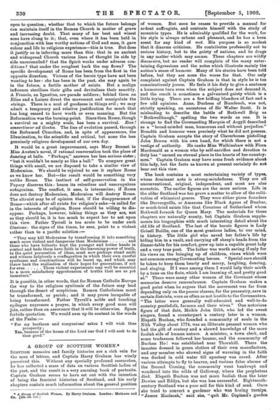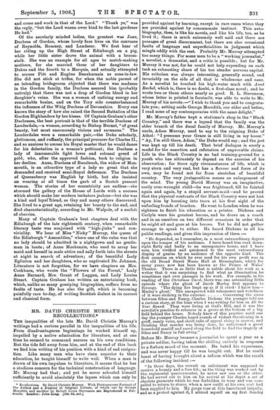A GROUP OF SCOTTISH WOMEN.* SCOTTISH memoirs and family histories
are a rich vein for the man of letters, and Captain Harry Graham has wisely perceived this. Without any specially profound researches, be has collected a mass of data on various Scottish ladies of the past, and the result is a very amusing book of portraits. Captain Graham seems to have set out with the intention of being the feminist historian of Scotland, and his early chapters contain much information about the general position • A Group of Scottish Women. By Harry Graham. London : Methuen and Co. [10e. 6d. net.]
of women. But soon he ceases to provide a manual for ardent suffragists, and contents himself with the study of eccentric types. He is admirably qualified for the work, for his style is always urbane and pleasant, and he bus a keen scent for any kind of mot. His purpose is so modest that it disarms criticism. He contributes professedly not to serious history, but to the gaiety of nations, and he drags in any matter which may amuse. These chapters are wildly discursive, but no reader will complain of the many enter- taining digressions and the notes which illustrate mainly the author's sense of humour. Many of his stories have been told before, but they are none the worse for that. Our only complaint against Captain Graham is that in style he is too conscientiously jocose. He feels it his duty to give a sentence a humorous turn even when the subject does not demand it, and the result is sometimes a galvanised gaiety which is a little trying. There are a few trifling blunders of fact and a few odd opinions. Anne, Duchess of Buccleuch, was not, strictly speaking, an ancestress of Sir Walter Scott. It is misleading to describe the battle of Bothwell Brig as " Bothwellhaugh," spelling the two words as one. It is strange to find the Covenanting Marquis of Argyll described as a "broad-minded man, humorous and without prejudice." Breadth and humour were precisely what he did not possess. Captain Graham accepts the story of Claverhouse pistolling John Brown with his own hand, for which there is not a vestige of authority. He ranks Miss Walkinshaw with Flora Macdonald as a woman who by self-sacrifice and devotion to duty has " earned an eternal place in the hearts of her country- men." Captain Graham may have some fresh evidence about this lady, but the facts as known at present certainly do not bear out this view.
The book contains a most entertaining variety of types, whose dominant note is strong-mindedness. They are all unconventional, original, independent, and most are also eccentric. The earlier figures are the more serious. Life in the older Scotland was too grave a matter to allow of the culti- vation of whimsical graces. They were either pious founders like Dervorgnilla, or Amazons like Black Agues of Dunbar, or much-tried saints like that Countess of Sutherland whom Bothwell forsook for Queen Mary. The materials for these chapters are naturally scanty, but Captain Graham supple- ments his biographies with much interesting detail about the old life of Scotland. The last of the heroic figures is Lady Grisell Baillie, one of the most gracious ladies, to our mind, in history. The little girl who saved her father's life by hiding him in a vault, and carrying off sheep's heads from the dinner-table for his comfort, grew up into a capable great lady and a very true poet. The father was worth saving if only for his views on the bringing up of children, views which were not common among Covenanting heroes. " Special care should be taken to keep them hearty and merry, laughing, dancing, and singing. If I were among them I would help their mirth by a tune on the flute, which I am learning of, and pretty good at." There were many other women of the Covenant whose memories deserve remembrance. Captain Graham makes a good point when he argues that the movement was far from depending only on the poorer classes, for the peasantry, save in certain districts, were as often as not hostile to the Covenanters. " The latter were generally well-educated and well-to-do country gentlefolk, farmers and their wives." One notorious figure of that date, Meikle John Gibb, who led the sweet singers, found a counterpart a century later in a woman. Elspeth Buchan, who founded a community of souls in the Nith Valley about 1774, was an illiterate peasant woman who had the gift of oratory and a shrewd knowledge of the more foolish side of human nature. A minister, a town clerk, and some tradesmen followed her banner, and the community of Buchan Ho! was established near Thornhill. There the inmates dressed in green clothes of their own manufacture, and any member who showed signs of wavering in the faith was ducked in cold water till apostasy was cured. After various attempts to fly to heaven, and various false alarms of the Second Coming, the community went bankrupt and wandered into the wilds of Galloway, :where the prophetess died. Elspeth Buchan was not more foolish than the later Dowies and Eddys, but she was less successful. Eighteenth- century Scotland was a poor soil for this kind of seed. Once she tried to convert a gardener who was hoeing turnips. "James Macleosh," said she, "quit Mr. Copland's garden
and come and work in that of the Lord." "Thank ye," was the reply, "but the Lord wasna ower kind to the last gardener He had."
Of the secularly minded ladies, the greatest. was Jane, Duchess of Gordon, whose lovely face lives on the canvases of Reynolds, Romney, and Landseer. We first hear of her riding up the High Street of Edinburgh on a pig, while her little sister drove the animal with a broom- stalk. She was an example for all ages to match-making mothers, for she married three of her daughters to Dukes and the fourth to a Marquis, and actually attempted to secure Pitt and Eugene Beanharnais as sons-in-law. She did not stick at trifles, for when the noble parent of an intending bridegroom objected that there was madness in the Gordon family, the Duchess assured him (probably untruly) that there was not a drop of Gordon blood in her daughter's veins. She was a woman of untiring energy and remarkable brains, and on the Tory side counterbalanced the influence of the Whig Duchess of Devonshire. Every one knows the story of how she raised the Second Battalion of the Gordon Highlanders by her kisses. Of Captain Graham's other Duchesses, the best portrait is that of the terrible Duchess of Lauderdale,—a woman, according to Bishop Burnet, "of great beauty, but most enormously vicious and ravenous." The Lauderdales were a remarkable pair,—the Duke scholarly, gluttonous, and ruffianly, the principal procurer for Charles IL, and so anxious to amuse his Royal master that he would dance for his delectation in a woman's petticoat; the Duchess a lady of innumerable light loves and colossal greed of gold, who, after the approved fashion, took to religion in her decline. Anne, Duchess of Buccleuch, the widow of Mon- mouth, is an attractive type of a lady so great that she demanded and received semi-Royal deference. The Duchess of Queensberry was English by birth, but she insisted on wearing at all times the garb of a Scotch peasant woman. The stories of her eccentricity are endless—she stormed the gallery of the House of Lords with a success_ which should make her modern imitators jealous—but she was a kind and loyal-friend, as Gay and many others discovered. She lived to a great age, retaining her beauty to the end, and died characteristically, according to Mr. Walpole, of a surfeit of cherries.
Many of Captain Graham's best chapters deal with the Edinburgh of the late eighteenth century, when remarkable literary taste was conjoined with " high-jinks " and con- viviality. We hear of Miss "Nicky" Murray, the queen of the Edinburgh "Assemblies," where one of the rules was that no lady should be admitted in a nightgown and no gentle- man in boots ; of Anne Mackenzie, who used to array her maid and herself in male attire and sally forth into the streets at night in search of adventure; of the beautiful Lady Eglinton and her daughters, who so captivated Dr. Johnson. Literature is not forgotten, for we have chapters on Mrs. Cockburn, who wrote the "Flowers of the Forest," Lady Anne Barnard, Mrs. Grant of Laggan, and Lady Louisa Stuart. Captain Graham has written an entertaining book, which, unlike so many gossiping biographies, suffers from no faults of taste. He has also the gift, which is becoming painfully rare to-day, of writing Scottish dialect in its correct and classical form.







































 Previous page
Previous page